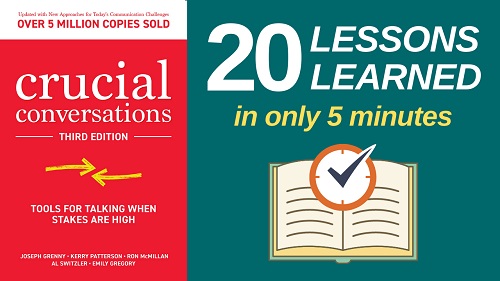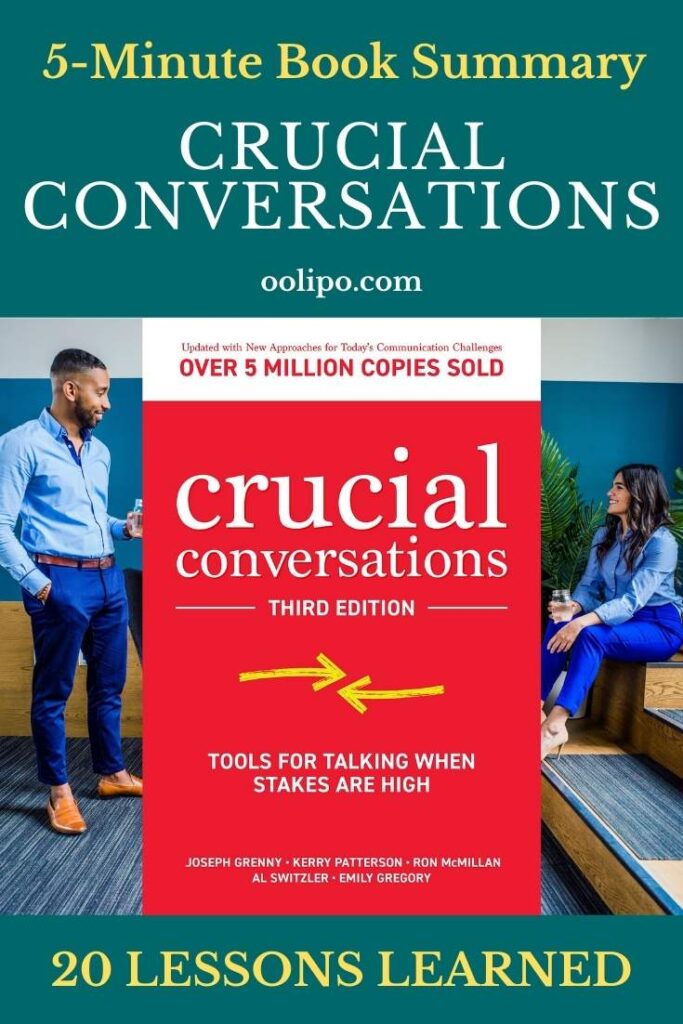Crucial Conversations: Tools for Talking when Stakes are High is a motivational book written by Joseph Grenny, Al Switzler, and Ron McMillan in 2001. In this Crucial Conversations summary, we will dive deep into their perspective on communication and human interactions.
Sometimes we need to have extremely important conversations. You can learn about how we should prepare and think for this in this book written by Joseph Grenny, Al Switzler, and Ron McMillan. They explained the subject very well with the dialogues.

Crucial Conversations Summary with 20 Lessons Learned
Here are the 20 lessons to learn from Crucial Conversations Summary:
#1 Be Aware of Yourself
It’s hard to take care of yourself when you get caught up in the excitement of speaking, but you can improve a little each time. When you increase your awareness of your movements, it will be easy to correct.
#2 Waiting Your Turn to Talk
While the other person is speaking, the only thing you do should not be your turn to talk. You must be an active listener. By asking questions, you should get enough information from the other party and try to understand their point of view.
#3 Make Sure You Understand
Redirect what the other person has told you with different words and see what he or she responds to. Try to make sure that he is expressing what he is saying or whether you have understood what he is saying correctly.
#4 Interrupting the Other
If you don’t want to turn the conversation into an argument, don’t interrupt, even if you anticipate what the other person is going to say. In addition, if the person you interrupted says something else afterward and you didn’t guess correctly, it would be a great loss for you.
#5 Express it Differently
The subject you want to tell may be misunderstood. Don’t take it as an attack on you that they don’t believe what you’re told. Retell with different words. Ask them to say what they don’t understand. Sometimes you may need to explain it in simpler words.
#6 They May Not Be Listening To You
Stop talking as soon as you realize you’re not listening. Don’t tire yourself out. It doesn’t matter if what you have to say is important or unimportant. If you’re struggling to keep talking even though you’re not being listened to, your value drops. Nobody cares what you’ve got to mention next.
#7 Look Curious
The way to encourage people to talk is to show that you’re curious about what they’re talking about. As they see that you are inquisitive, they will be eager to give you more information on the subject.
#8 What Is Your Purpose?
The environment you grew up in, the education you received, and your goals may be different from the person you are talking to, but if you both have a common purpose, reveal that purpose. If you bring out this purpose, the conversation will become more productive.
#9 Don’t React
If you stop acting by thinking and start giving emotional reactions, the control is completely on the other side. If you want to control the other side, you must first be able to control yourself. You can’t get what you want from the other side unless you control your nerves.
#10 Don’t Sell Dreams
In important conversations, people tend to make huge promises to get what they want. Even if it brings you to the fore during the conversation, if you cannot meet the expectations, in the long run, you will fall behind the point you started.
#11 Give Confidence
For a conversation to go well, both sides must be open to each other. Confidence builds gradually but can be destroyed in one go. If you lose confidence, it will not be easy to recover from this situation. Do not resort to lies to impress the other party.
#12 Keep Talking
Just because you’ve started speaking doesn’t mean you have to say everything on your mind. Observe the person in front of you and act accordingly. He may be tired, stressed, or distracted at the moment. In such cases, it is better to close the issue without engaging in important conversations.
#13 Place and Time
The place and time of the speech should be a joint decision. You should choose a place where you both feel good and safe, where there is no noise and you will not be disturbed by others. If you do not choose a good location, your day will be wasted and you will not get the result you want.
#14 It Will Be Difficult
It is necessary to accept from the beginning that important conversations will be difficult. You cannot predict how it starts and how it will end. It can go much better than you expected, or at the end of the day, it can go so bad that you wish you hadn’t spoken at all. Be prepared for any situation.
#15 Get a Result
When the discussion is over, it is very important to come up with a result that everyone will be satisfied with. You will not be having this discussion again, and your bond with the person will be strengthened. Let everyone feel good after the discussion and close the topic.
#16 Don’t Avoid Talking
As mentioned earlier in this Crucial Conversations summary, the people you need to talk to will not always be well-meaning and respectful. You will also encounter aggressive and disrespectful people. They will try to humiliate you. If you treat them the same way, you will lose. It’s very easy to yell anyway, don’t do it. Continue with rational answers without breaking your style.
#17 Emotions Don’t Work
Don’t let your feelings decide what to say. Whatever you want to achieve during the conversation, do not go outside of it. Do not stray from the plan. Don’t let the other side exploit your feelings. Be firm in getting what you want.
#18 Content
If you are not sure that you have mastered the content of the conversation, do not start it at all. Even if you’re right, you have a hard time defending yourself. Because of your lack of knowledge, you cannot properly evaluate what the other side tells you.
#19 Don’t Pretend
If you don’t know what the other party is saying, don’t pretend to know. Don’t try to save the day. Say “I don’t know” and ask for clarification. You show that you are confident, do not shy away from criticism, and that you want to learn something.
#20 Planning Ahead
Your conversation probably won’t go as planned, but it’s still important to plan. Because you are thinking of alternatives without realizing it. Create the plan without obsession and continue spontaneously according to the progress of the conversation.
Top 10 Quotes from Crucial Conversations
1. “We act in self-defeating ways. In our doped-up, dumbed-down state, the strategies we choose for dealing with our crucial conversations are perfectly designed to keep us from what we actually want. We’re our own worst enemies and we don’t even realize it.”
2. “Conversely, when people aren’t involved, when they sit back quietly during touchy conversations, they’re rarely committed to the final decision. Since their ideas remain in their heads and their opinions never make it into the pool, they end up quietly criticizing and passively resisting.”
3. “People who are best at dialogue understand this simple fact and tum it into the principle “Work on me first.” They realize that not only are they likely to benefit by improving their own approach but also that they’re the only person they can work on anyway.”
4. “Asking questions about what we really want serves two important purposes. First, it reminds us of our goal. Second, it juices up our brain in a way that helps us keep focused.”
5. “Hoping to remain safe. Of course, we don’t always fix mistakes, aggressively discredit others, or heartlessly try to make them suffer. Sometimes we choose personal safety over dialogue. Rather than add to the pool of meaning, and possibly make waves along the way, we go to silence”
6. “First, stay alert for the moment a conversation turns from a routine or harmless discussion into a crucial one. In a similar vein, as you anticipate entering a tough conversation, pay heed to the fact that you’re about to enter the danger zone.”
7. “Some people’s first cue is not physical or emotional, but behavioral. It’s like an out-of-body experience. They see themselves raising their voice, pointing their finger like a loaded weapon, or becoming very quiet. It’s only then that they realize how they’re feeling.”
8. “In fact, with experience and maturity we learn to worry less about others’ intent and more about the effect others’ actions are having on us. No longer are we in the game of rooting out unhealthy motives.”
9. “However, when stakes rise and our emotions kick in, well, that’s when we open our mouths and don’t do so well. In fact, as we suggested earlier, the more important the discussion, the less likely we are to be on our best behavior. More specifically, we advocate or express our views quite poorly”
10. “Sometimes parents (and leaders) are tricked into accepting poor performance by silver-tongued individuals who are infinitely creative in coming up with new ways to explain why they didn’t know any better. Not only do these inventive people have the ability to conjure up creative excuses, but they also have the energy and will to do so incessantly.”
Free PDF Download of Crucial Conversations Summary to Save or Print
We created a PDF file with the summary and quotes on this page for easy access: Download Crucial Conversations PDF Summary. If you want to buy the paperback version of the book, check out this page.
Animated Summary
Joseph Grenny on The Art of Crucial Conversations
Please share these important lessons by pinning this post to Pinterest.
